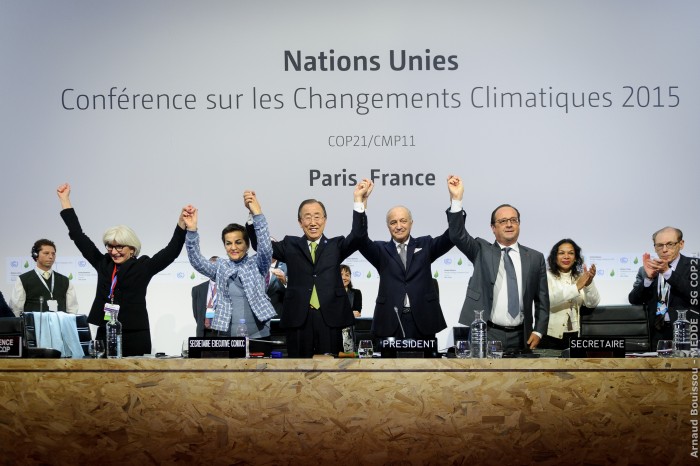If “historic” and “landmark” are missing from your dictionary, it’s no wonder. They could use a break. Kudos are being heaped from quarters far and wide about the outcomes of COP21. But there are also sobering times ahead, particularly given the five-year kick-in period during which the global political landscape can change several times — there will be two presidential campaigns here in the U.S. alone. To help guide us through what we know now, we have chosen the commentary of six climate-adept reporters, including Pace’s own Andrew Revkin. Read on.
Landmark Agreement on Climate
By Fred Pearce
 environment360
environment360
Climate negotiators meeting here in Paris have achieved a deal that could change the world. Conference chair and French foreign minister Laurent Fabius crowed that he had presided over a “historical turning point.” Even when the hype has died down, that may turn out to be true. Even climate scientists who on Friday had sharply criticized an earlier draft of the text were convinced.
More from Fred Pearce at environment360
The Climate Path Ahead
By Andrew C. Revkin
 The New York Times
The New York Times
As legions of bleary-eyed diplomats, environmentalists and lobbyists make their way home across the planet, you’ll hear proclamations that COP 21, as the meeting was called, was a historic turning point, and a profound failure.
Both will be right, depending on the scale of reference.
More from Andrew Revkin at The New York Times.
COP21: Climate Deal’s Challenges Dawn on World Capitals
By Pilita Clark
 Financial Times
Financial Times
[E]very five years, almost every government in the world is set to go through what most experienced in the run-up to the Paris conference that sealed the new pact: unusually intense public scrutiny of its climate plans and how these commitments measure up to those of other nations.
More from Pilita Clark at the Financial Times
The One Word That Almost Sunk the Climate Talks
By Andrew Restuccia
 Politico
Politico
Obama administration lawyers discovered early in the day that the latest draft text had a potentially deal-killing tweak: Deep into the document, in Article 4, was a line declaring that wealthier countries “shall” set economy-wide targets for cutting their greenhouse gas pollution. . . the GOP-led chamber would kill it on sight.
More from Andrew Restuccia at Politico
How US Negotiators Ensured Landmark Paris climate Deal Was Republican-Proof
By Suzanne Goldenberg
 The Guardian
The Guardian
[A]s administration officials pointed out after the deal was done, the agreement reached in Paris was constructed with a view to making it safe from Republican attacks – which was one reason negotiations were so difficult.
More from Suzanne Goldenberg at The Guardian.
After Paris Climate Agreement, Will Innovative Energy Projects Take Off?
By Michael Kaplan
 International Business Times
International Business Times
As the field of renewable energy grows, innovative ideas are likely to start sprouting up, especially given the finer focus on finding sustainable alternatives in the agreement reached Saturday.
More from Michael Kaplan at International Business Times










